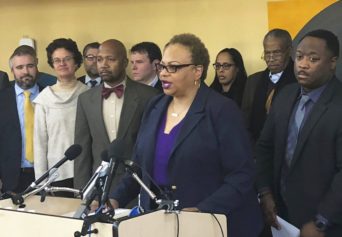If state legislators in Texas pass a voting law that clearly discriminates against Blacks and Latinos, can the law be called racist if the legislators never said they intended to discriminate against Blacks and Hispanics?
That is the question being weighed by a federal judge in Texas, who is presiding over a legal challenge to the state’s voter-identification law filed by the U.S. Justice Department, a handful of Black and Hispanic voters, elected officials and advocacy groups.
It is the sort of question that haunts African-Americans, who are often challenged to prove that they have been the victims of racism if no one around them has used any racist language. The same dilemma plagues the legal system when prosecuting hate crimes — If no one uses hate speech, how do you prove hateful intent?
In a Texas courtroom Monday, lawyers challenging the voter-ID law told Judge Nelva Gonzales Ramos of the United States District Court for the Southern District of Texas — a 2011 Obama appointee — that the law makes it difficult for more than a half million Texans to vote. They used the state’s long history of discrimination as proof of the law’s racist intent.
Both sides gave their closing arguments Monday in a trial that began Sept. 2. The plaintiffs hope Ramos delivers her decision well in advance of the Nov. 4 election so that Texans can vote without the new requirements.
Texas “has used race as an issue that has defined its politics and has too often defined its policy,” Chad W. Dunn, a lawyer for some of the plaintiffs, told the judge.
The attorneys referenced Texas’ use of whites-only primaries, poll taxes and the discriminatory redrawing of electoral district lines to show that the state has often had racist intent in passing voter laws. A three-judge federal panel in Washington agreed in 2o12, ruling that maps drawn by the Texas Legislature for state Senate, state House and congressional districts discriminated against minority voters. The voter ID laws currently being challenged were passed in the same 2011 legislative session.
The Justice Department and civil-rights lawyers said the nearly all-white Texas Legislature wrote the law to eliminate forms of ID that are more accessible to minorities and retained those more accessible to whites — with the idea of creating a voting environment more amenable to Republicans because the Black and Hispanic population in the state is growing at such a rapid rate.
“They were warned over and over again by the minority legislators and by members of their own staff that a restrictive photo ID law like the one that was passed would have an adverse impact on minorities, but they did nothing,” Ezra D. Rosenberg, a lawyer for the Texas NAACP and the Mexican-American Legislative Caucus, told reporters after the hearing.
But a lawyer representing Texas, Adam W. Aston, said the Justice Department has not identified any statements made by a lawmaker or staff member that showed a desire to harm minorities or to give an advantage to Texas Republicans.
During the trial, the judge heard from many elderly voters who testified about how difficult it had been for them to get the necessary documents or ID to vote.
While Aston, the state’s principal deputy solicitor general, acknowledged that some voters bore a heavier burden than others, he said it was legally insignificant because 95 percent of Texas voters already possessed a form of ID required by the law.
Texas officials have also made the familiar claims of using the law to prevent voter fraud — a claim that has been made in many states that have passed new voter ID laws, though all of them have had a hard time identifying cases of attempted fraud.
The Texas law prohibits the use of student IDs, making it harder for students to vote if they don’t have a driver’s license or a passport.
Richard Dellheim, a lawyer for the Justice Department’s Voting Section, said Texas has done such a poor job of facilitating the distribution of ID cards that the state has issued only 279 election ID cards — compared to 2,200 cards issued in Georgia in a similar program.

